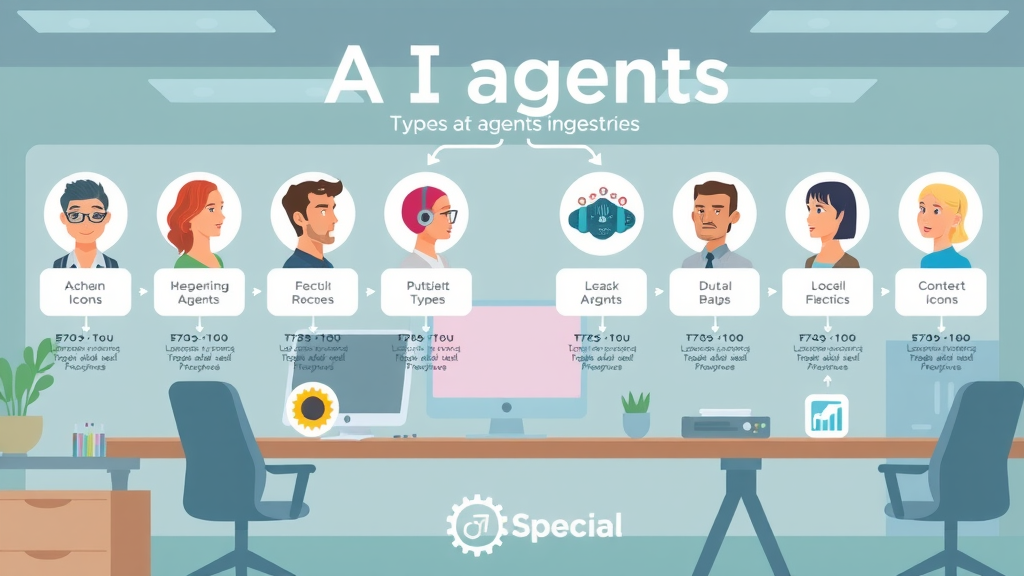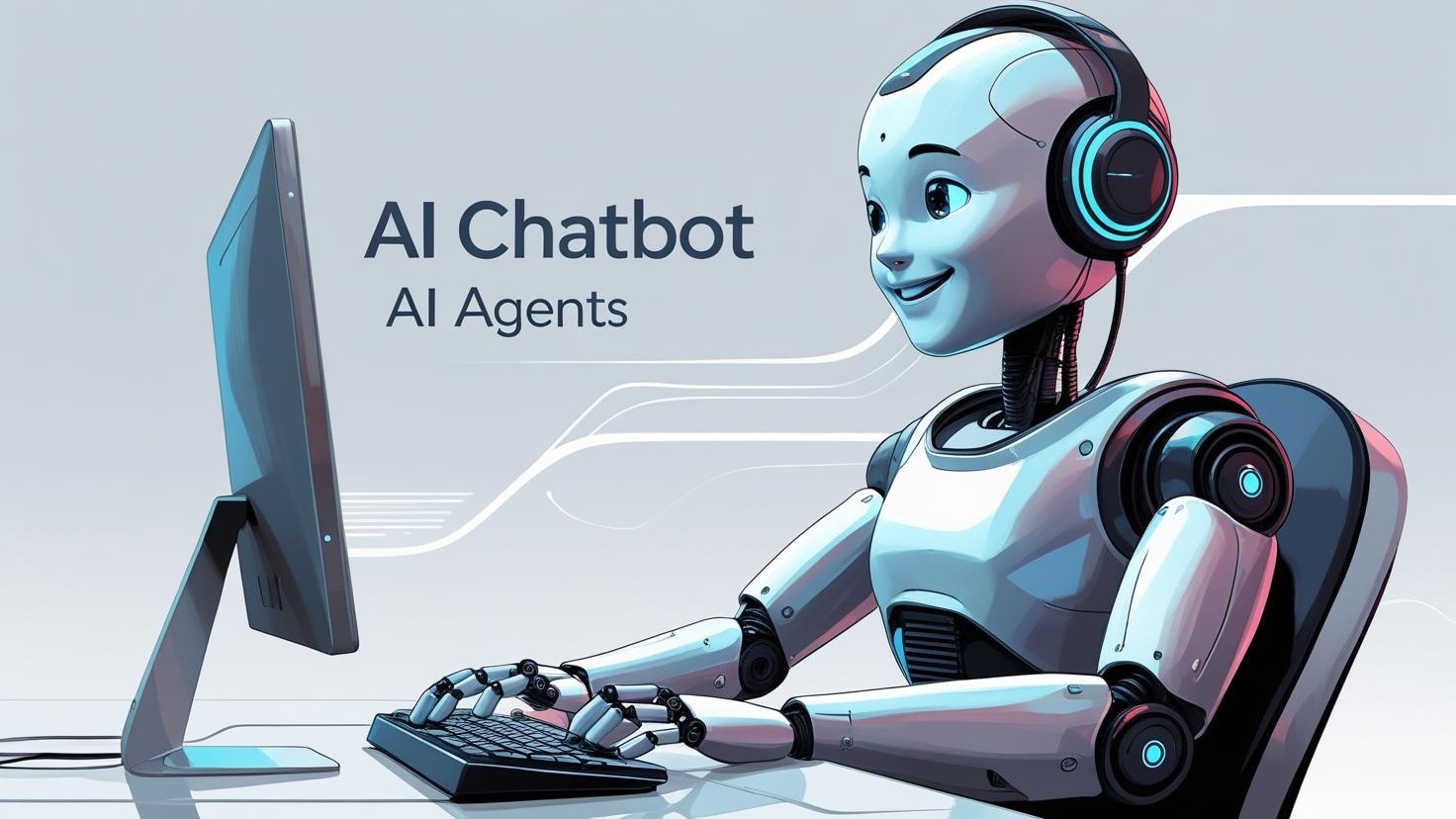Did you know that companies leveraging AI agents combined with advanced AI tools can save up to 35% on routine tasks and significantly reduce operational costs? Imagine reclaiming hours each week while your business operates around the clock! This article reveals how artificial intelligence is revolutionizing daily workflows for businesses like yours, letting you achieve more with less hassle.
The Rise and Impact of the AI Agent in Modern Business
"Businesses leveraging AI agents see up to 35% time savings on routine tasks and a 50% reduction in operational costs." — Recent Industry Report

AI agent adoption rates in SMEs vs. large enterprises are soaring, with small businesses increasingly embracing AI to remain competitive.
The financial and operational impacts of AI agents are evident: companies often see cost savings within a few months, and employee satisfaction improves as repetitive tasks are automated.
Story: Carrie, a retail business owner, reclaimed 20 hours a week by automating inventory checks, order confirmations, and appointment scheduling with an AI agent, allowing her to focus on growing her brand.
What You'll Learn About AI Agents
What is an AI agent and how do AI agents work?
Types of ai agents and where they fit in business processes
Benefits: cost savings, better customer experience, uninterrupted operations
Practical examples from real businesses using ai agents
How to select the right ai agent for your unique needs
AI Agent Use Cases vs. Traditional Methods (Savings in Time & Cost) |
|||
Process |
Traditional Method |
With AI Agent |
Typical Savings |
|---|---|---|---|
Call Answering |
Full-time Receptionist |
AI agent handling calls 24/7 |
Up to 80% cost; never miss a call |
Data Entry |
Manual entry staff |
Automated processing by AI agent |
75% time; 50% cost |
Appointment Scheduling |
Phone/email coordination |
Self-service AI-based scheduling |
60% time; improved customer satisfaction |
Customer Inquiries |
Support team responses |
Instant AI agent answers |
Up to 90% faster response |
As you explore the practical benefits and use cases of AI agents, it’s also valuable to understand how these solutions fit within the broader landscape of AI-powered marketing tools. For a deeper dive into the specific technologies and strategies that can further boost your business performance, schedule a strategic call with us at Digital Marketing All.
What Does an AI Agent Do?
An AI agent acts as a digital helper for your business, efficiently handling time-consuming tasks by integrating seamlessly with powerful AI tools to boost workflow automation and enhance software development processes. Whether it’s answering calls, processing data, sending reminders, or tracking orders, an AI agent performs tasks swiftly and consistently, reducing basic manual work and freeing human experts for higher-value projects. Modern AI agents utilize machine learning, natural language processing, and large language models to efficiently communicate with clients, interpret requests, and provide answers instantly—24/7, without breaks.
Unlike basic automated systems, the latest generation of AI agents and reflex agents—including simple reflex agents and reflex agent models—adapt to complex workflows, significantly enhancing overall business efficiency. They don’t just execute simple tasks; they learn customer preferences, personalize responses, and even trigger actions in other business tools. By integrating seamlessly into your existing systems, AI agents make it easy to streamline everything from customer service to back-office operations, driving better business outcomes with less effort.
Understanding AI Agent Basics
Definition: An AI agent is an intelligent agent—a software system powered by artificial intelligence that can perform tasks, make decisions, and interact with users autonomously.
How do AI agents work behind the scenes? AI agents leverage machine learning and large language models to process natural language, classify information, and respond contextually to user or business needs. They connect with databases, CRM systems, or communication channels, ensuring data flows smoothly across your workflow.
Key functions and tasks: From answering incoming calls, handling emails, and scheduling appointments to managing inventory and processing payments, AI agents tackle repetitive tasks while continuously learning and improving from new data.
"With our AI agent, missed calls dropped to zero. Business is open 24/7." — Cafe Owner Testimonial

How AI Tools and AI Agents Work Together
Today's most powerful business solutions blend the unique strengths of AI agents and AI tools to automate and optimize workflows effectively, driving superior business outcomes. These combinations enable companies to automate entire business processes, from simple reflex tasks (like routing a support request) to model-based or utility-driven strategies (such as managing a customer’s purchase journey). By leveraging AI systems that coordinate multiple AI agents and AI tools, your company can deliver faster, smarter, and more reliable services to both clients and staff.
Whether writing emails with large language models or automating invoice processing, AI agents powered by integrated AI tools handle both routine and complex tasks with impressive accuracy, showcasing how AI agents work effectively within software development environments and modern workflows. The collaboration of AI agents and AI tools ensures every step in your workflow is covered, leading to greater business efficiency, enhanced customer experience, and reduced operational costs.
Integration: AI Agents, AI Tools, and Reflex Agents
Overview of key AI tools that enhance agent capabilities: Examples include scheduling assistants, generative AI for content creation, and data-processing bots that support agents in complex workflows.
Simple reflex vs. model-based agents: A simple reflex agent reacts instantly to specific triggers (think auto-responders), while model-based and goal-based agents use context and history to make more nuanced decisions.
Combining AI agents and AI tools brings about seamless, end-to-end automation that helps businesses maximize operational uptime with minimal oversight.

Business Storytelling: How AI Agents Transformed Real Companies
The right AI agent can be a game-changer for businesses of all sizes, transforming workflows and enhancing customer experience. For example, a small medical clinic implemented an AI agent to handle appointment calls, process patient data, and route urgent messages. Within weeks, patient wait times dropped by 40%, and administrative staff were able to focus on critical cases rather than repetitive phone work. This personalized, always-on service led to higher customer satisfaction and notable time savings for both staff and patients.
Across industries, companies find that AI agents not only lower operational costs but also help deliver services customers remember. AI-powered systems allow business owners to confidently offer 24/7 support—no more missed inquiries or opportunities. Whether you’re a solo entrepreneur or running a large firm, an AI agent has the flexibility to adapt as your needs evolve.
Customer Experience Successes
Case Study: In a medical clinic, an AI agent streamlined service calls by automatically answering routine questions, booking appointments, and collecting preliminary patient information before visits. Staff were freed from endless phone duties, and patients reported faster, friendlier service.
"We've never had a smoother customer experience," said the clinic manager. "Our AI agent remembers returning patients and even provides important reminders, improving both efficiency and loyalty."
With 24/7 operation, these businesses never miss a customer inquiry, enabling real competitive advantage in competitive industries.

A Breakdown by Industry
E-commerce: Automated order handling, shipment notifications, and real-time support via AI agents drive sales and streamline customer journeys.
Legal: Appointment scheduling, client intake processes, and document management are simplified, letting legal teams focus on high-priority cases.
Hospitality: 24/7 booking support, instant guest communication, and automatic follow-ups ensure no reservation is missed and guest satisfaction remains high.

The Types of AI Agents: Which Fits Your Business?
Reflex agent vs. simple reflex agents: Reflex agents respond instantly to environmental stimuli without considering past states; simple reflex agents excel at repetitive, triggered responses but are limited in handling complex scenarios.
Model-based, goal-based, and utility-based agents: More advanced agents consider past interactions (model-based), aim for specific business goals (goal-based), or weigh options for the best overall outcome (utility-based).
Choosing the right AI agent involves aligning business needs with agent capabilities, ensuring seamless integration with your AI tools and software development environments for optimal performance.

Comparison Table: Types of AI Agents, Features, and Recommended Applications |
|||
Type |
Key Features |
Ideal For |
Sample Use Case |
|---|---|---|---|
Simple Reflex Agent |
Responds instantly to conditions; no memory |
Repetitive tasks |
Call forwarding, auto-replies |
Model-Based Reflex Agent |
Considers previous states; adapted routine |
Task follow-ups |
Returning customer recognition |
Goal-Based Agent |
Decides based on end goals |
Dynamic support, sales |
Lead scoring, personalized upselling |
Utility-Based Agent |
Maximizes business-wide benefits |
Complex decision-making |
Supply chain optimization |
Learning Agent |
Improves via experience & data |
Continuous process improvement |
Predictive support, customer trends |
How to Get Started with an AI Agent for Your Workflow
Implementing an AI agent and associated AI tools becomes straightforward once you understand how AI agents work within your existing software development environment and business workflows. Here’s how you can smoothly introduce this technology into your daily processes and start seeing immediate results:
First, analyze your day-to-day business process to spot time-consuming, repetitive tasks where AI agents and AI tools can deliver the most value. Next, research available ai agents and supporting ai tools, comparing features, integration flexibility, and ROI. Once you’ve selected your solution, work with your team or a consultant to integrate the AI system with your software development environment—ensuring everything syncs seamlessly. Finally, measure the results and refine your setup to maximize benefits like time saved and boosted customer experience.
Step-by-Step: Bringing an AI Agent into Your Business
Assess workflow needs and identify pain points where an AI agent can deliver instant value—common areas include appointment scheduling, customer inquiries, and inventory management.
Evaluate available ai agents and ai tools for your industry—compare options for their ability to automate complex or repetitive tasks.
Integrate your chosen AI agent with existing software development environments and business processes, using APIs or low-code connectors for a fast and easy setup.
Track ROI by monitoring time saved, reduction in operational costs, and improvements in customer experience over the first six months.

Understanding AI Agent Costs and ROI
Price brackets: Basic reflex agent solutions may start as low as $30/month, while advanced utility- or goal-based agents designed for complex tasks or tailored to your business can be several thousand dollars for custom builds.
Subscription vs. custom AI agent: For most small businesses, subscriptions to AI agents offer the best value and fastest results—custom solutions are ideal for unique needs or advanced automation goals.
Performance stat: Businesses commonly recoup AI agent costs in under six months, making AI investment a smart, quick-return move.

What Makes the Best AI Agents: Key Features to Look For
Seamless integration with popular ai tools: The best AI agents integrate seamlessly with your CRM, calendars, messaging apps, and other essential AI tools to ensure smooth workflow automation.
Robust customer experience automation: Quality AI agents not only automate support but personalize every touchpoint, remembering previous interactions to keep customers engaged and satisfied.
Adaptability: Look for AI agents that allow deep customization for your software development needs, scale as you grow, and adapt to new business challenges or technologies.

People Also Ask: AI Agent FAQ
What does an AI agent do?
An AI agent can answer calls, process data, schedule appointments, and handle repetitive business tasks automatically, freeing up human resources for higher-value work.
Who are the Big 4 AI agents?
While the landscape is constantly evolving, as of 2025 the leading AI agents include OpenAI’s ChatGPT, Google’s Bard, Microsoft’s Copilot, and Amazon’s Alexa for Business.
How much does an AI agent cost?
AI agent costs typically range from $30/month for entry-level subscriptions to several thousand dollars for custom-built solutions, with ROI measurable in months for most business sizes.
What are the 5 types of AI agents?
The five types of AI agents are: Simple Reflex Agent, Model-Based Reflex Agent, Goal-Based Agent, Utility-Based Agent, and Learning Agent.
Key Takeaways: Why AI Agents Are a Must for Modern Workflows
AI agents transform business efficiency and customer experience, letting you do more with less effort while significantly improving customer satisfaction and operational workflows.
With 24/7 operations, you’ll never miss a business opportunity—even when your human team is off the clock.
The cost and time savings are significant, regardless of your industry or company size.

Conclusion: Embrace the Power of the AI Agent
AI agents unlock remarkable cost, time, and service benefits for forward-thinking businesses of all sizes.
If you’re ready to grow, innovative AI agent solutions are easier to access than ever before.
Expect even smarter AI agent advancements on the horizon—now’s the best time to start!
As you consider integrating AI agents into your workflow, remember that the future of business is being shaped by rapid advancements in artificial intelligence. Staying ahead means not only adopting the right tools but also understanding how broader trends—like Google’s evolving AI-powered search—will impact your visibility and customer engagement. For a strategic look at what’s next and how to future-proof your business, contact us at Digital Marketing All. This next step will empower you to make smarter decisions and maximize the value of your AI investments.
Frequently Asked Questions about AI Agent
How do I integrate an AI agent into my current system? Most AI agents provide plug-and-play or low-code integration with existing business software, simplifying software development and deployment while enhancing workflow automation. Choose an AI agent provider with strong support and clear documentation to ensure smooth software development and integration.
How secure are AI agents with sensitive business client data? Leading AI agents utilize strong encryption, user authentication, and comply with data privacy regulations to guarantee secure software development and protect sensitive business data, ensuring trust and compliance. Always confirm your agent meets your industry’s security standards.
Can AI agents be customized for niche industries? Absolutely. Many AI agents and platforms allow industry-specific customization, letting businesses in fields like healthcare, legal, or retail enjoy tailored automation and support.
Ready to Transform? Contact Us to Launch Your AI Agent
If you would like your own AI Agent, contact us at Digital Marketing All. 207-710-1449
 Add Row
Add Row  Add
Add 








Write A Comment